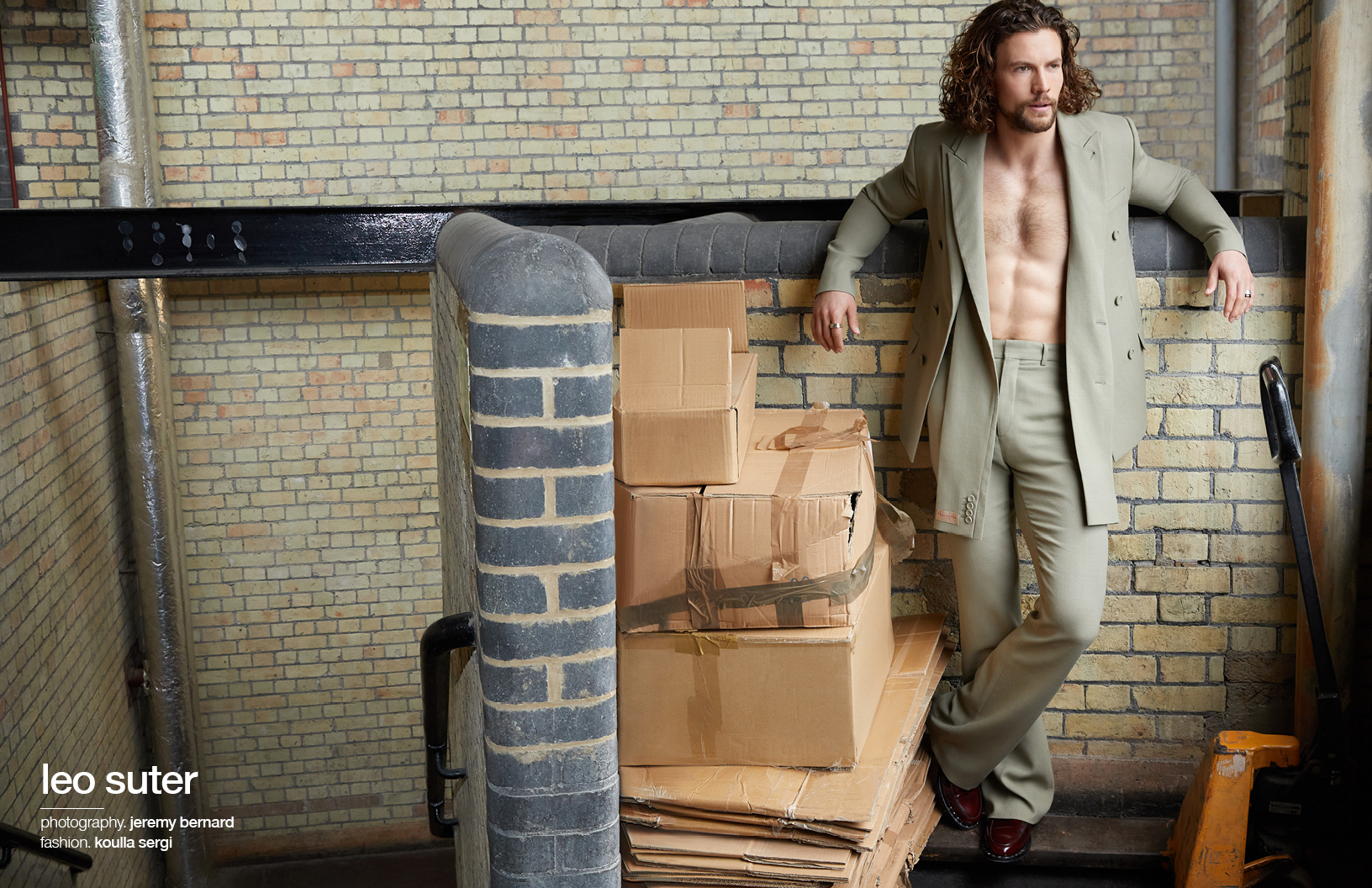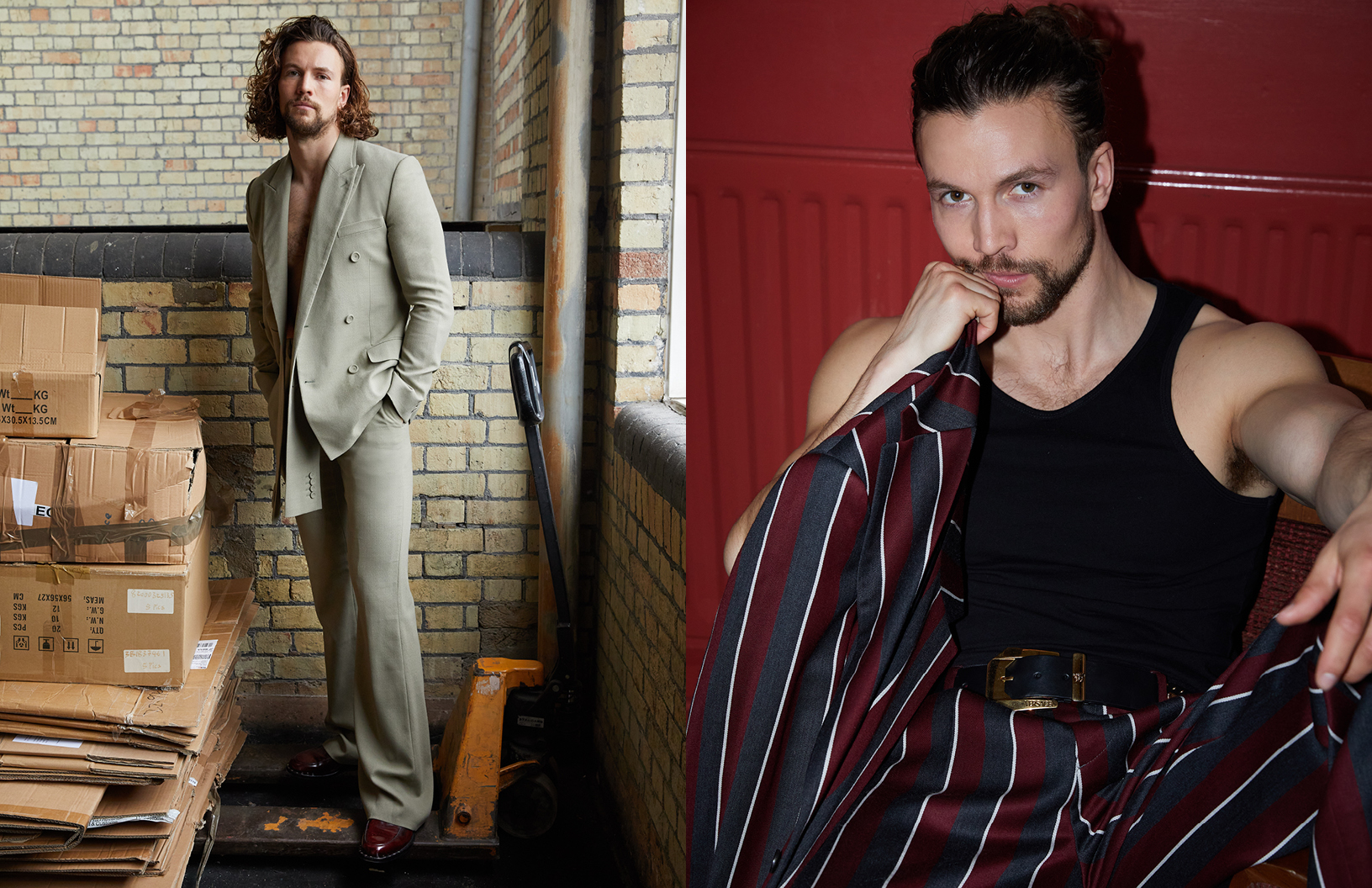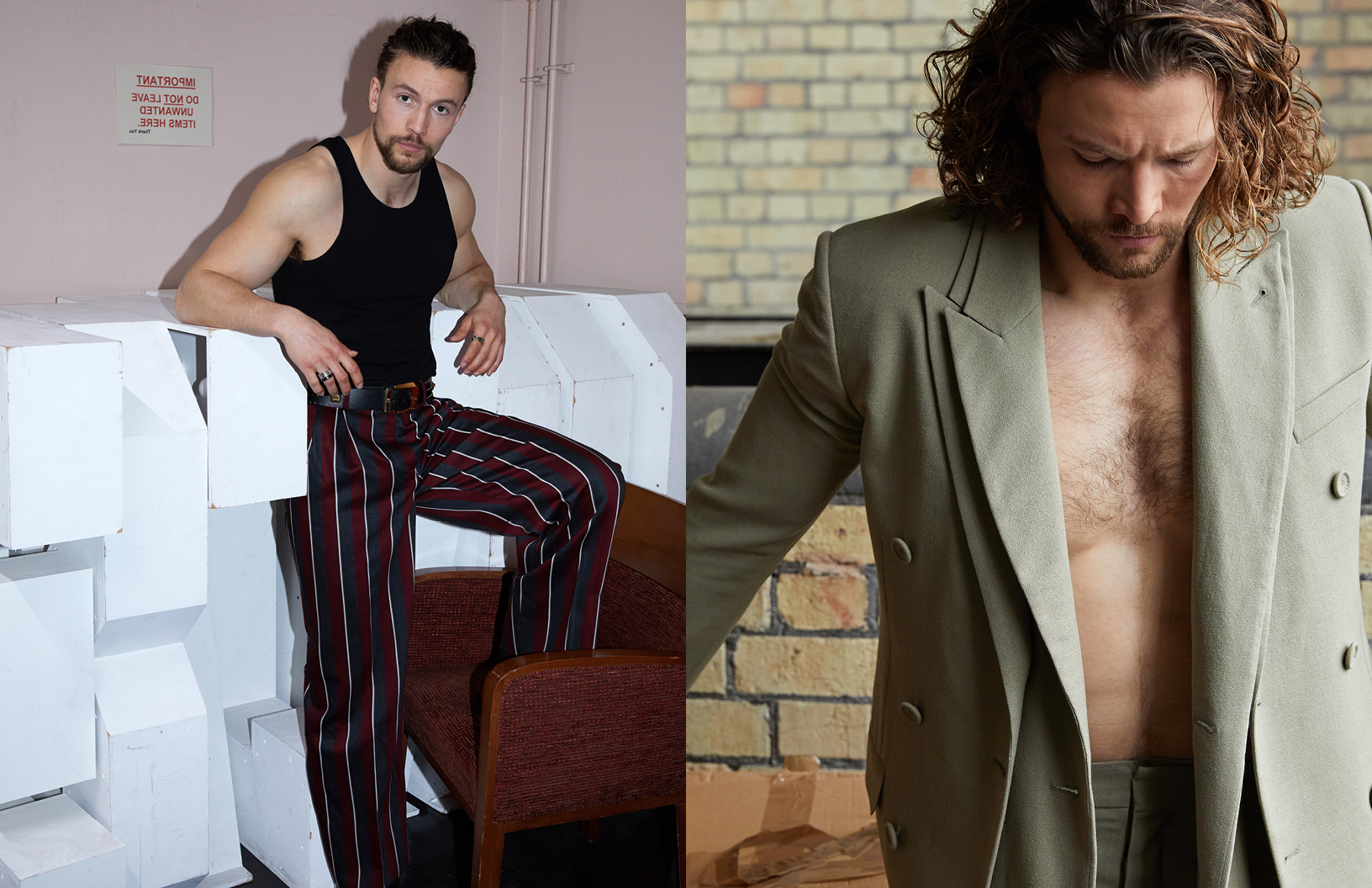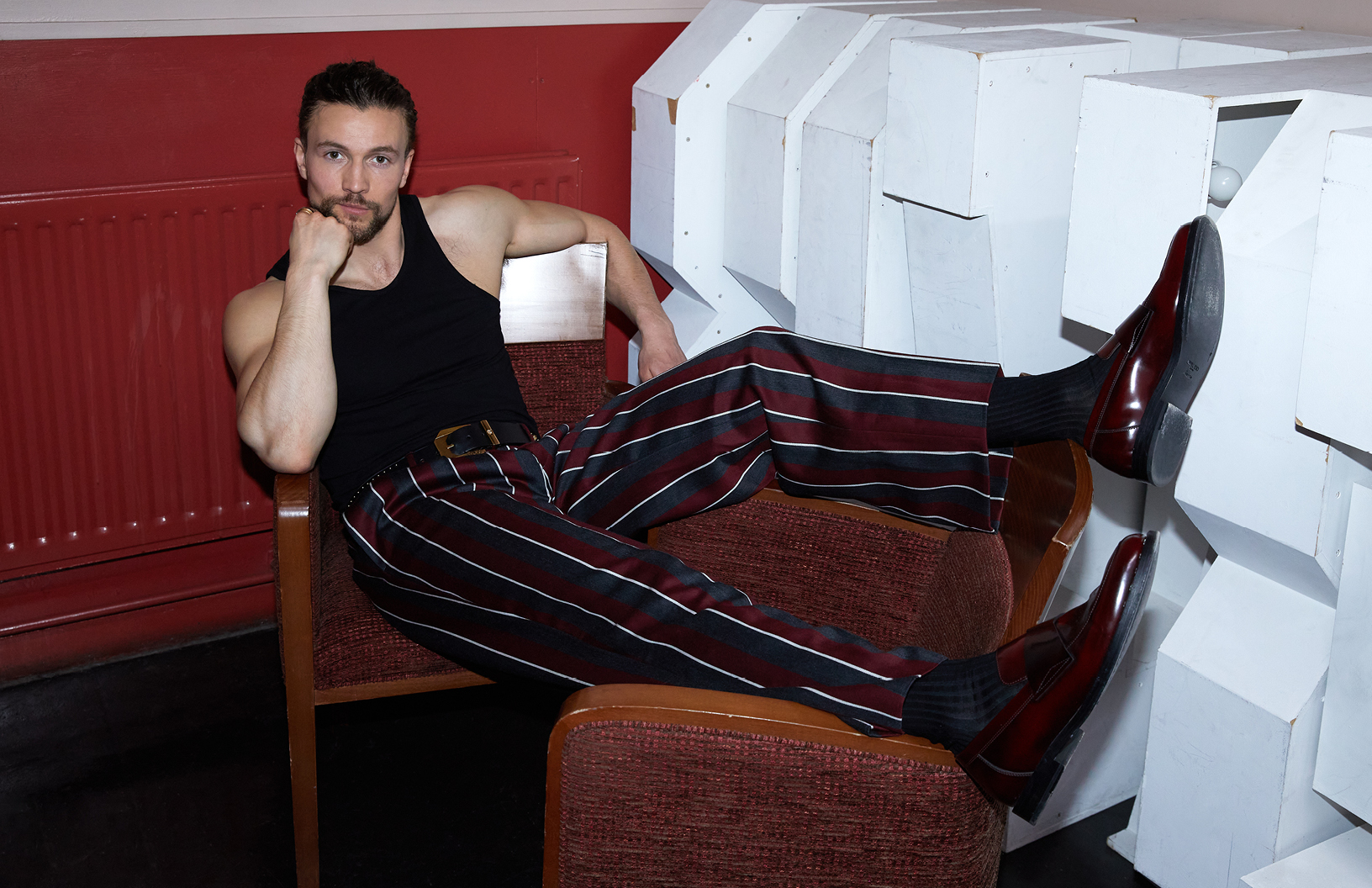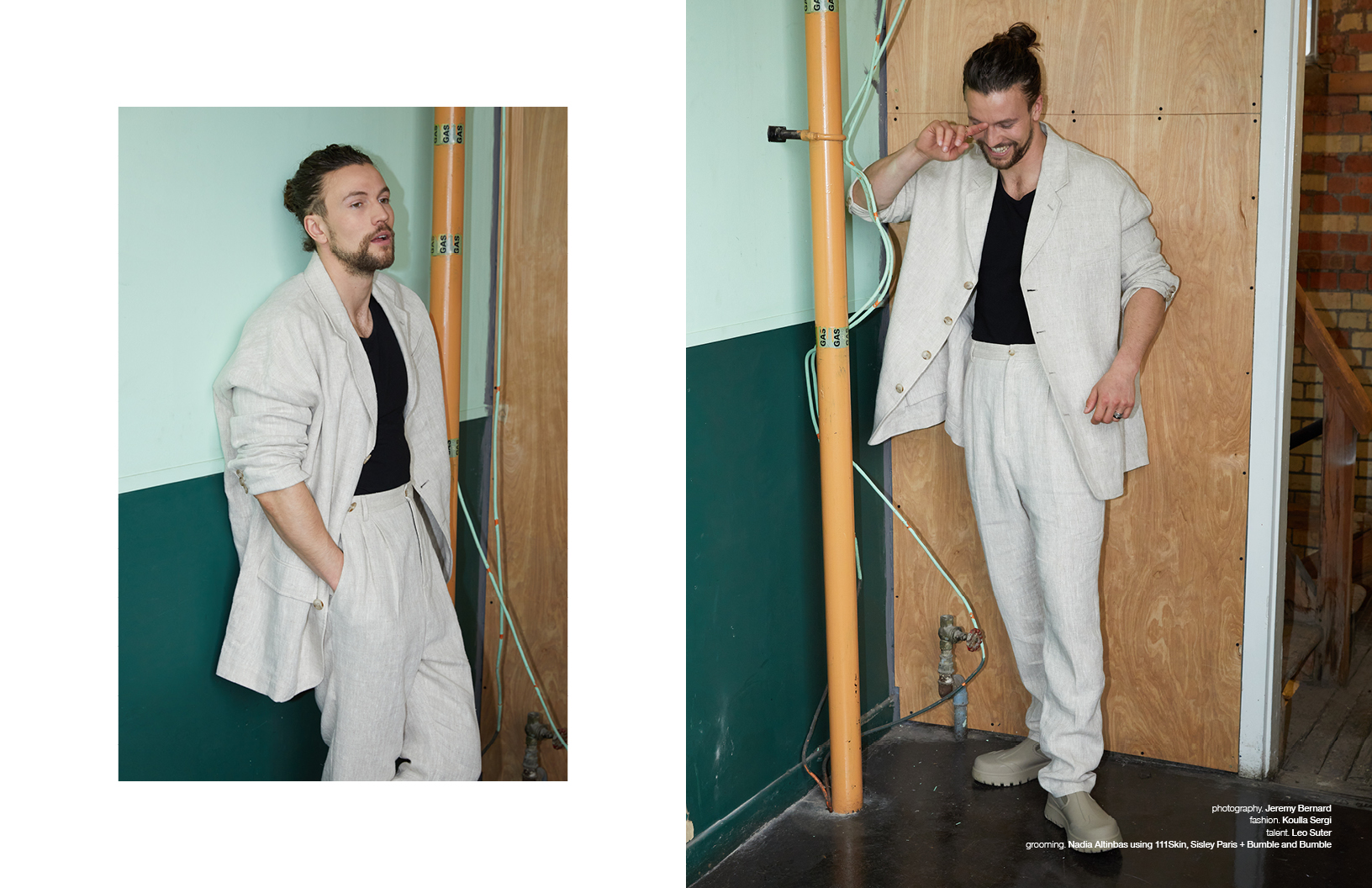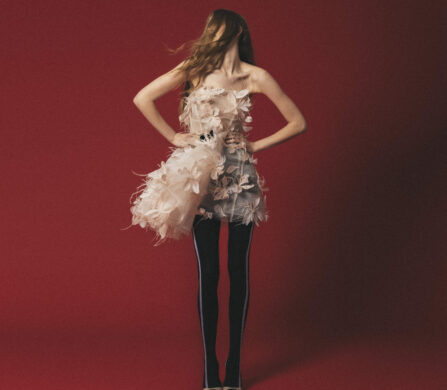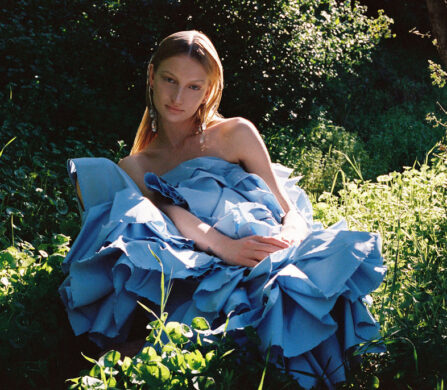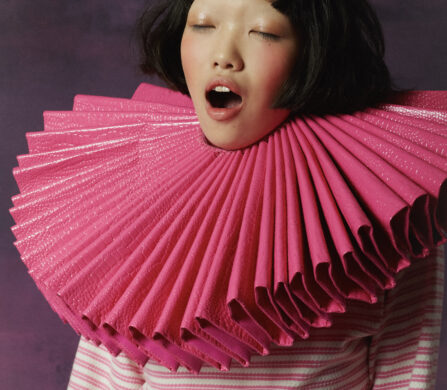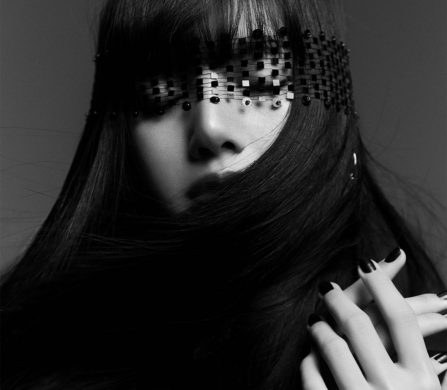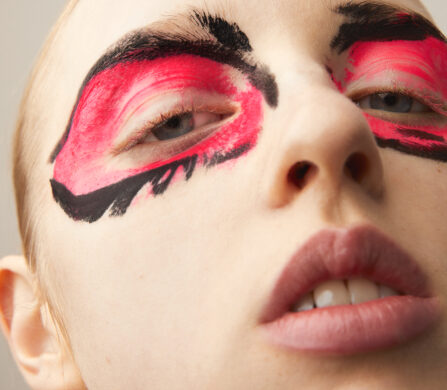With no shortage of sex, violence, corrupted politics, and medallion-clutching suspense, Vikings: Valhalla is the history-based, edge-of-your-seat drama that details the Viking invasion of England, and the perilous ascension of Norse King, Harald Hardrada, to leading the Byzantine Empire’s elite Varangian Guard. Portraying the role of King Harald is Leo Suter, a real-life, low-key history buff with a knack for storytelling. Great consideration was devoted to discerning the nuances of King Harald, and Suter successfully anchored the dynamism of the king’s persona within these variations.
On a break from shooting and back from Rome, Suter chats with Schön! and breaks down the inescapable complexity of a high-stakes existence, revelatory life lessons learned while depicting the game-changing leader, and so much more.
I am excited to speak with you! I interviewed your Vikings: Valhalla costar Sam Corlett a few weeks ago for Schön! I am eager for you to share a new perspective about the plot and cast chemistry.
Sam stayed in this house [Leo’s apartment], by the way. He crashed here in London for a week. He was a man of mystery and out on the town.
He was probably doing different retreats and things like that. He seems like he is most likely sitting in the forest or in the park meditating.
Well, maybe. Maybe not.
I could be so wrong—I’ve only known Sam for all of 30 minutes. But, I am getting to know Prince Harald well, and what I love about the show is that he is the kind of leader that I respect: efficient, practical and straightforward. I just gave three words to describe him, unintentionally. What three words would you use to describe Harald?
I think strong-willed. Can that count as one word? It’s hyphenated, so that will count as one. A bit belligerent —“a bit” is important, because sometimes he’s not — and headstrong. I’ll give you a list and you can pick: [he is] brave and [has] courage in his convictions. I think that’s an important one to have in there as well. It’s been cool because we’ve now done three seasons and Harald has changed and learned a lot. I can’t give too much away for season three, because I’ll get a slap on the wrist from Netflix.
I got to know about Harald Hardrada as an old man — and how he died in 1066 — which is a very famous year in English history. It was a very famous battle in which he died. But that was him as an aged Viking King, the last to try and become the King of England. What these first three seasons have allowed us to do is look at Harald Hardrada; the young man and the journey that got him to 1066. It was a bit of history that I didn’t know much about, but what this man got up to is quite extraordinary. He made his way around Europe making a name for himself when he was banished after fighting a battle with his brother, which we alluded to in season one. That big Battle of Kattegat doubles as the historical battle in which Harald got exiled. Then, in history for the next 20 to 30 years, he was starting again from scratch in Constantinople. In season two—
Don’t give too much away! I am at episode seven of season two, so I haven’t seen him make it yet to Constantinople.
Well, let me tell you — spoiler alert — he makes it [laughter]. He makes it, but also that is history that’s in the books. I remember conversations with Jeb [Jeb Stuart, the show’s creator], and he said, “in season two, everything you’re comfortable with about Harald will go out the water. Harald’s going to be starting from scratch.” That was quite exciting because one of the cool things about doing a show that’s large in scope and runs for many episodes and several seasons is never quite feeling comfortable… It’s quite a nice feeling to always be challenged and a bit surprised. Right when you think you sort of know what you’re doing and you’re comfortable in the relationship between characters, like Harald and Freydis in episode one, straight away Jeb’s thinks, “nope, we’re going to break those two up, and they’re going to forge their own paths, do their own different things.” So, Frida and I filmed together for a really lovely two weeks at the beginning of season two, and then it was, “bye, girl! Have fun in Jomsborg, I’ll be off on the Dnieper River.”
You have done in-depth research on King Harald. Is he the kind of leader that you could submit to or serve under? We just discussed his leadership qualities. Is he a leader that you would respect?
Oh, that’s a good question… Yes, I think he is. You’re asking me, as Leo? Yes. Look, Harald makes some good speeches and good rhetoric. I think he could sway me there.
And he can back up what he says. Unlike a lot of “leaders,” he walks his talk.
He does. I think, as Leo, I’d want to unpick why he wants to become a king quite so much. Like, do we have to go all the way to Constantinople? How is this journey going to get you there? Those are the kinds of questions that Leif is asking him. Leif’s sort of figuring out what his purpose [is], and why does he want to become king? I think, as a leader, I would want to be sure that he was genuine about what he’s talking about. The thing to unpick will be, “why do you want to be king?” What’s that all about?
I love that you referenced his journey and eagerness to get to Constantinople and questioned the motivations behind that. One of the things that stuck out to me most on a personal level within season two was the scene when he chose to sacrifice the cargo so that he could continue the journey by ship. When the people saw him sacrifice the cargo, they joined him in his mission. They submitted to what he wanted to do and followed through with that. For me, it was crystallized in the series—especially in that specific scene—that leadership is anchored in sacrifice.
Yes, that’s a very beautiful way of saying what I couldn’t say two minutes ago… [Laughter]. It is a sacrifice. You’ve put your finger on it nicely. If season two was first about furs [cargo] in episode two or three, by episode five it’s about the people. It’s about the love and the friendship that’s on that boat. It’s quite an effective metaphor of Harald just throwing overboard the material that is slightly meaningless and prioritizing the lives of his friends and keeping people safe. It is a very powerful and beautiful sort of sentiment — that idea of putting your friends first and realizing what’s important.
Building off of that last realization of Prince Harald’s sacrifice, what was the last thing you had to sacrifice?
That’s a good question… Doing Vikings: Valhalla during a pandemic was in some respects a massive godsend and a blessing. I’m very lucky to be able to work through a pandemic, but it did mean leaving home for five months. Even though England is a hop, skip, and a jump away from Dublin, I wasn’t allowed to be in Dublin. I certainly wasn’t allowed visitors or family and friends. We did bunker down in a small fishing village for four months and then say goodbye to a lot of friends and family, so that was quite intense. While we’re on that topic, I’d like to shout out other cast members who, unlike me, had small families and put in serious sacrifices to be in Dublin and to comply with all the rules and regulations and weren’t able to see their little ones. I don’t think my sacrifice counts. Shout out to all those actors who did do that because the show wouldn’t have worked if they hadn’t.
Well, thank you for ushering in my next question which deals with relationships and rapport. The series — at least for Harald and Freydis and Leif, the other two lead characters — pivots on relationships, the dynamics, and different challenges within these relationships. You have three main relationships in the series: the contentious familial relationship with Olaf, the complicated romantic relationship with Freydis, and the complicated brotherhood with Leif because it is almost like competing over who is the biggest alpha male. Which of those dynamics resonate most closely with you within your relationships?
In what sense do you mean, though? Because there’s one we should put in there—let’s not forget Harald’s relationship with Elena.
Let’s unpack Harald’s relationship with Elena. How would you describe it?
Yeah, it’s unexpected. In some senses, it’s distracting. Harald is going to Constantinople to raise an army and become king. I don’t think he was expecting to suddenly find that he was building a romantic pull in some direction. It’s complicated, confusing, and unexpected.
Harald is such a straightforward, direct, and even combative person at times. How on earth does someone so straightforward and practical find himself in so many complicated relationships? It is like he thrives in complicated relationships!
I think that’s true of most of the characters who receive some pretty hard situations. Leif and Maryam, Leif and Liv… But yeah, why does he get himself in such a twist? I think because the stakes are always quite high. I think when you want to become king, which is the pinnacle of what one could achieve as a Viking back then, there are sacrifices that you have to make. That’s probably true with contemporary examples, right? If you or I want to become the best at something, it’s hard to have relationships. There are sacrifices and complications that you have to juggle and navigate if being the best is one of the things that [is] driving you. Things are complicated with Freydis because, despite a serious degree of compatibility between these two personalities, there’s a distinct incompatibility with their aspirations and their hopes and dreams. And likewise, why things are complicated with Elena —
Are you telling me what happens in episode eight? Oh no!
Harald discovers that this treasure that he’s been delivering is not the medallion around Elena’s neck — it is Elena. She emerges from this tent as this beautiful Empress. Suddenly, that is kind of everything Harald wants. It’s so confusing because it’s something that’s out of his reach. Instead, this girl, Elena, who is someone he thought was just a nice girl on the boat, turns out to be the Empress of Constantinople. She is one of the most powerful people in the world. That is super intriguing and powerful for Harald; there’s a twinkle in his eye at the end of season two. At which point the audience should be thinking, “Okay, what does this mean?” Because in some respects, it’s a loss, and Harald’s now lost something. He’s a bit stunned by it. In other respects, he now has a contact. He has the email addresses of the most powerful people in the Byzantine world. He’s got an in and he’s got a shoe in the door. So that’s a complicated relationship, for sure.
Going back to something you said about five minutes ago… We discussed sacrifice and when stakes are high, relationships do get complicated, no matter how straightforward you are. Your landing on one of the top shows on Netflix places high stakes in your trajectory. Do you find yourself surrounded by complicated relationships or drawn to them?
I’m very lucky that my private life ain’t too complicated. It’s quite simple and lovely. So, I’m fortunate in that regard. That’s probably all I’d say about that.
In episode two, you had this blood-thirsty fight scene — it was like Fight Club from a thousand years ago. It was so brutal, yet I couldn’t look away from it. In training for that scene, did you sustain injuries?
That was one of my favourite scenes to film in this series partly because I hadn’t done boxing or wrestling or things like that before. I was getting to learn a new skill which was very exciting. The stunt team taught me all the steps and it’s a lot like a dance. It required a bit of patience to begin with but then, eventually, I figured it out and had a great time doing it. I got in great physical shape because the training and the cardio of rehearsals —which were every day when I wasn’t filming — were very intense. There was a shutdown because of COVID, so the filming of that scene got delayed for two months. It was interesting because it meant I had to maintain the fighting physique for most of season two. What were some of the injuries? I always hurt my toes, which I got so much grief for. But because I’m fighting barefoot, for some reason, I kept twisting and spraining my toes, which all the stunt department found hilarious. I got punched in the ribs a couple of times… Yeah, I felt it a few days later.
Were you an athlete before this? Watching you, I was thinking, “he must be a rugby player.”
Well, you can’t play rugby as an actor because you’d hurt yourself. I played rugby at school and a bit of cricket and now I play tennis. I played a fair bit of tennis with Jeb, our showrunner and writer. We would discuss Harald’s journey over tennis on the weekend. I wasn’t a fighter or a boxer, so that was some new skill that I picked up and enjoyed. It’s not a spoiler to say that in season three all of the skills Harald’s learned he gets to continue to use.
I remember when speaking with Sam, he went into great detail about how he integrated his life within the lives of the locals in the town [you filmed in]. How did you integrate yourself — or not — within the local community where you were based?
For season two, I moved into Dublin because I had hoped that by then, COVID would have been a distant memory. That wasn’t quite the case, but all of the cast were in Dublin and it felt strange to not be there. I wanted to be there for season two and hang out with them which, by the end of filming, we were allowed to do. We were able to go out together on weekends and go to the pub because, during a week of filming, stuff goes wrong and stuff goes right. Some things are funny and some things are gossipy and, for me, it’s a big thing to be able to hang out with a cast and share those funny stories.
I should say as well, Sam was out in Greystones and I was in Dublin. I lived on this incredible street called Singh Street and I had neighbours there who weren’t actors and they became some of my best mates. There was a lady called Marianne [who lived] on my street that I befriended early on. We would just sit on my stoop, have a glass of wine, and shoot the shit. She would tell me Irish myths about giants and fairies and I’d tell her about Vikings and longships. I honestly think we all fell in love with Ireland a little bit. I fell in love with [Dublin]. One of the things I liked about it compared to London is it’s much more local. You can walk down the street and run into people [you know], which I imagine if you did that for a long time might become annoying, but for the two years that I was there, I loved it. We went camping a fair bit because it was before things opened up, so we drove out west. As beautiful as Dublin is, the west coast is just something else. I had some amazing times with some of the cast members exploring the countryside and just pitching a tent on a beach and falling in love with Ireland.
Do you think that the fact that you were so immersed in this storyline from this historic period was part of the magic you experienced being in Ireland?
Yes, except for a lot of the things that Harald is going through in season two… They are not easy and comfortable. I don’t think he’s falling in love, whereas that [was] sort of what I was doing outside of work. Then Harald sort of gets tortured, he gets strung up on hooks in episode seven, right? So, the fact that the life I was living outside of work was so different from what Harald was going through was very nice. I think what’s going on in season two is that Harald is making friends. On his boat of misfits, he’s making buddies and that sort of feeling of camaraderie, and teamwork… It’s something. When we were filming those scenes on the boat, everybody was in the background all the time, no matter what the primary scene was. The whole cast is on the boat all the time. That sort of forces you to spend a lot of time with each other, get close and form friendships. It puts you in a social frame of mind, I guess, to answer your question. Maybe that helped me infuse life outside of work with this sense of, “okay, we’re all here together as a team and as a family, so let’s make the most of that.”
In some way, that energy might have spread by osmosis, if you will, on camera to behind the scenes. You did extensive research on Harald while living as him and portraying him for two years. What did the process of getting into that character — and understanding him — teach or reveal to you about life and yourself?
Kindness is king. I think that’s a good lesson in general. You learn that early on when you’re a family. That’s the thing that I would take away because when you’re filming for four or five months, and you’re all on a boat together, just be kind and have a laugh. I think that’s what I took away from it. It’s not very profound, and it’s quite simple, but it is effective.
Well, I am going to take that away with me. I am going to keep that in mind. Even in those moments where I get a little cranky, kindness is king.
I realized when you watch Harald punching and elbowing the crap out of someone that it might be hard to remember, but it’s somewhere in there, bubbling under the surface.
You said something earlier about his courage in his convictions. When you said this, the word that instantly came to me was integrity. He has integrity.
He does have integrity… Actually, what Harald taught me was to work hard and to keep plugging away. Keep plugging away, get your head down and work hard. Season two is about how he’s not where he wants to be, and he’s just got to sort of put his head down and work away to get what he wants to get… That didn’t make any sense. Go with kindness is king. That’s much better. [Laughter].
Vikings: Valhalla is out now on Netflix.
photography. Jeremy Bernard
fashion. Koulla Sergi
talent. Leo Suter
grooming. Nadia Altinbas using 111Skin, Sisley Paris + Bumble and Bumble
interview. Constance Victory


Schön! Magazine is now available in print at Amazon,
as ebook download + on any mobile device












